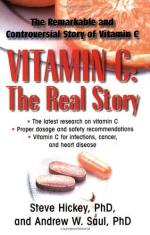|
This section contains 907 words (approx. 4 pages at 300 words per page) |

|
Unlike other water-soluble vitamins, vitamin C, or ascorbic acid, doesn't appear to act either as a catalyst or as a coenzyme. Its primary role is a major one, however: regulating the formation of collagen, a protein that makes up the connective tissue found in skin, bones, cartilage, teeth, muscles and the walls of blood vessels. As an important antioxidant, vitamin C also helps protect vitamin A, vitamin E and various fatty acids from the damage caused by excessive oxidation.
Because little of vitamin C is stored in the body, a daily dietary source is necessary. The vitamin is found almost exclusively in fruits and vegetables, particularly in citrus fruits such as oranges and lemons (interestingly, most animals synthesize their own vitamin C. Only primates, guinea pigs and a few fairly exotic creatures--such as the Indian fruit bat--need to get the vitamin from food). Today cereals, infant...
|
This section contains 907 words (approx. 4 pages at 300 words per page) |

|


